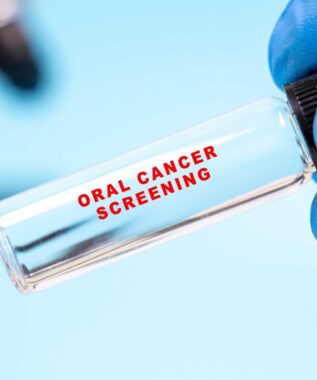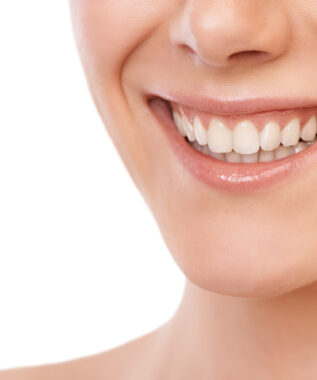 It is never too early to begin teaching excellent oral hygiene habits to your little ones, especially proper brushing and flossing. What’s more, the right combination of preventive care at home, maintaining a healthy diet, and attending routinely schedule dental visits can contribute to a lifelong smile and avoid the need for extensive treatment such as extraction or dental implants down the line. Indeed, your dentist recommends a regular checkup at least once every six months, and the same can be said for tiny grins. In today’s blog, your Leawood, KS dentist will explain the importance of attending regular dental visits and the impact it has on your child’s beautiful smile.
It is never too early to begin teaching excellent oral hygiene habits to your little ones, especially proper brushing and flossing. What’s more, the right combination of preventive care at home, maintaining a healthy diet, and attending routinely schedule dental visits can contribute to a lifelong smile and avoid the need for extensive treatment such as extraction or dental implants down the line. Indeed, your dentist recommends a regular checkup at least once every six months, and the same can be said for tiny grins. In today’s blog, your Leawood, KS dentist will explain the importance of attending regular dental visits and the impact it has on your child’s beautiful smile.
Why Your Jaw Needs a Dental Implant
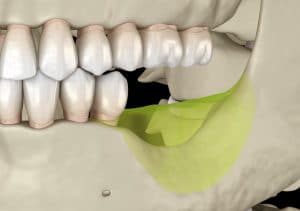 When it comes to dental care, maintaining a healthy smile is a priority for a number of individuals. What’s more, the notion of having a tooth extracted due to infection or other cause is nobody’s first choice, and a number of alternatives may be sought to prevent that from occurring. In some circumstances, however, removal may be the only step left in order to preserve your oral health. When you do have a structure removed, however, keep in mind that it is not the end of the journey. In today’s blog, your Leawood, KS dentist will explain why it is important to have a missing tooth replaced and what happens to your function when you do not.
When it comes to dental care, maintaining a healthy smile is a priority for a number of individuals. What’s more, the notion of having a tooth extracted due to infection or other cause is nobody’s first choice, and a number of alternatives may be sought to prevent that from occurring. In some circumstances, however, removal may be the only step left in order to preserve your oral health. When you do have a structure removed, however, keep in mind that it is not the end of the journey. In today’s blog, your Leawood, KS dentist will explain why it is important to have a missing tooth replaced and what happens to your function when you do not.
What Periodontal Care Really Means
 Attending routine preventive dental visits for some is not as simple as it is for others. In fact, fear or anxiety can often set in, causing patients to skip their regular visits. When this occurs, your risk for disease, infection, and more increase drastically, as you do not have a trained professional consistently monitoring the health of your smile. In today’s blog, your Leawood, KS dentist will look at the dangers of skipping your dental visit and why it may warrant extra periodontal care.
Attending routine preventive dental visits for some is not as simple as it is for others. In fact, fear or anxiety can often set in, causing patients to skip their regular visits. When this occurs, your risk for disease, infection, and more increase drastically, as you do not have a trained professional consistently monitoring the health of your smile. In today’s blog, your Leawood, KS dentist will look at the dangers of skipping your dental visit and why it may warrant extra periodontal care.
Straightening Your Smile with Invisalign®
 Being satisfied with your smile is more than just keeping up with its oral health. In fact, a grin is often the first attribute one notices about a person, meaning proper maintenance and care is necessary to maintain a lifelong shine. Indeed, major structural concerns such as missing teeth can be addressed with restorations such as crowns, bridges, and dentures, but what can be done about crooked teeth without tampering with your structures drastically? In today’s blog, your Leawood, KS dentist will address the benefits of straightening your smile with Invisalign® aligners.
Being satisfied with your smile is more than just keeping up with its oral health. In fact, a grin is often the first attribute one notices about a person, meaning proper maintenance and care is necessary to maintain a lifelong shine. Indeed, major structural concerns such as missing teeth can be addressed with restorations such as crowns, bridges, and dentures, but what can be done about crooked teeth without tampering with your structures drastically? In today’s blog, your Leawood, KS dentist will address the benefits of straightening your smile with Invisalign® aligners.
Easing Dental Anxiety with Sedation
 Even with routine preventive care, a number of concerns can still threaten the integrity of your smile. From cavities caused by decay to even total tooth loss, your dentist can help with a restorative procedure to help complete your grin once more. For many people, however, going to the dentist is a frightening thought, and often one that people choose to move forward with when their dental concern has advanced drastically past the point of a simple fix. In today’s blog, your Leawood, KS dentist will address how we can help you overcome your dental anxiety with the use of sedation.
Even with routine preventive care, a number of concerns can still threaten the integrity of your smile. From cavities caused by decay to even total tooth loss, your dentist can help with a restorative procedure to help complete your grin once more. For many people, however, going to the dentist is a frightening thought, and often one that people choose to move forward with when their dental concern has advanced drastically past the point of a simple fix. In today’s blog, your Leawood, KS dentist will address how we can help you overcome your dental anxiety with the use of sedation.
Bridging the Gap Between Teeth
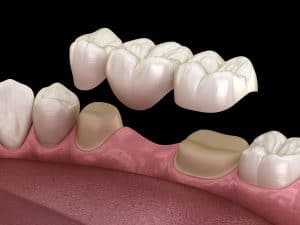 While there are a number of adults who are fortunate to maintain a lifelong smile, there is still a number that are not, often enduring structural loss. What’s more, once a tooth must be removed, your chances of losing other surrounding structures increases drastically, caused by factors such as decay, infection, and more. In today’s blog, your Leawood, KS dentist not only wants to address the concerns that arise from missing teeth but provides a solution that can complete your smile once again with the use of a dental bridge.
While there are a number of adults who are fortunate to maintain a lifelong smile, there is still a number that are not, often enduring structural loss. What’s more, once a tooth must be removed, your chances of losing other surrounding structures increases drastically, caused by factors such as decay, infection, and more. In today’s blog, your Leawood, KS dentist not only wants to address the concerns that arise from missing teeth but provides a solution that can complete your smile once again with the use of a dental bridge.
Is it Time for an Oral Cancer Screening?
 When most people attend their dental visit, their biggest concerns typically revolve around cavities, decay, and potential for tooth loss. In fact, these are often the driving factors for seeking a checkup, as a number of people associate the quality and health of their smile with their level of confidence. While these are great reasons behind attending a formal visit, they are not the only concerns your dentist will check for and help with. In today’s blog, your Leawood, KS dentist will discuss the process of performing an oral cancer screening and how it aids in preserving your health.
When most people attend their dental visit, their biggest concerns typically revolve around cavities, decay, and potential for tooth loss. In fact, these are often the driving factors for seeking a checkup, as a number of people associate the quality and health of their smile with their level of confidence. While these are great reasons behind attending a formal visit, they are not the only concerns your dentist will check for and help with. In today’s blog, your Leawood, KS dentist will discuss the process of performing an oral cancer screening and how it aids in preserving your health.
Allowing Your Tooth to Heal with a Dental Crown
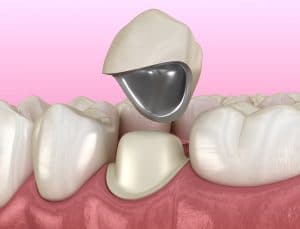 Making sure your teeth are healthy and taken care of goes a little bit further than routine preventive care at home. In fact, the standard practice is a combination of brushing and flossing, paying mind to what foods and beverages you consume, and attending scheduled checkups at least twice a year. Indeed, falling short on any one of these steps can lead to complications such as infections, plaque buildup, decay, and more. In today’s blog, your Leawood, KS dentist will look at the situations in which a dental crown may be necessary to preserve a compromised tooth and how to avoid these complications.
Making sure your teeth are healthy and taken care of goes a little bit further than routine preventive care at home. In fact, the standard practice is a combination of brushing and flossing, paying mind to what foods and beverages you consume, and attending scheduled checkups at least twice a year. Indeed, falling short on any one of these steps can lead to complications such as infections, plaque buildup, decay, and more. In today’s blog, your Leawood, KS dentist will look at the situations in which a dental crown may be necessary to preserve a compromised tooth and how to avoid these complications.
Answering Three Questions About Preventive Care
 When it comes to taking measures to sustain a healthy, lifelong smile, preventive care is the name of the game. In fact, routine preventive care can oftentimes help prevent much more serious dental concerns from arising down the line, such as decay, infection, and even tooth loss. While you may think you have a grasp on your oral health and brushing at home, there could be a chance that you are missing a vital step or two. In today’s blog, your Leawood, KS dentist will discuss the importance of staying on top of your hygiene as well as address a few questions to clear up any misconceptions.
When it comes to taking measures to sustain a healthy, lifelong smile, preventive care is the name of the game. In fact, routine preventive care can oftentimes help prevent much more serious dental concerns from arising down the line, such as decay, infection, and even tooth loss. While you may think you have a grasp on your oral health and brushing at home, there could be a chance that you are missing a vital step or two. In today’s blog, your Leawood, KS dentist will discuss the importance of staying on top of your hygiene as well as address a few questions to clear up any misconceptions.
Addressing Your Dental Emergency
 You can take all the right steps –brushing and flossing regularly, attending your scheduled checkups, and so on – and yet, accidents can still occur. Whether you are injured during physical activity, trip and land face-first on the sidewalk, or even simply bite down on a crunchy food item such as a chip, you may endure a dental emergency that could result in a broken tooth or even structural loss. Regardless of the circumstance, it is important to act efficiently in order to address your emergency concern, and your Leawood, KS dentist is here to help.
You can take all the right steps –brushing and flossing regularly, attending your scheduled checkups, and so on – and yet, accidents can still occur. Whether you are injured during physical activity, trip and land face-first on the sidewalk, or even simply bite down on a crunchy food item such as a chip, you may endure a dental emergency that could result in a broken tooth or even structural loss. Regardless of the circumstance, it is important to act efficiently in order to address your emergency concern, and your Leawood, KS dentist is here to help.




